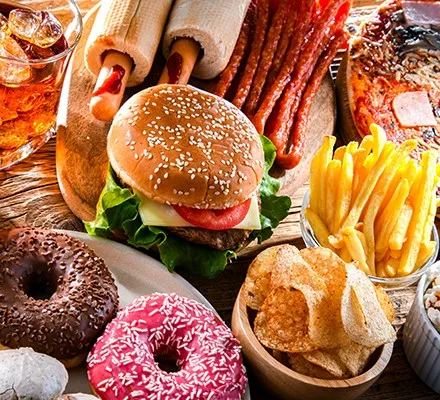a more in-depth study the element listing discovered a few things i’ve surely never baked with, together with carrageenan and sorbitan tristearate, additives used to do such things as thicken, emulsify and hold the flavor and enhance the texture of food.
Welcome to the arena of extremely-processed foods – edible products made from manufactured ingredients which have been extracted from foods, processed, then reassembled to create shelf-strong, tasty and convenient food. “these are ingredients which are business creations,” says Allison Sylvetsky, an companion professor within the department of exercise and nutrition on the George Washington Milken Institute school of Public health.

And we’re consuming quite a few them. extremely-processed meals currently make up nearly 60% of what the everyday adult eats, and nearly 70% of what children devour. The class consists of the whole lot from cookies and sodas to jarred sauces, cereals, packaged breads and frozen food, even ice lotions. You might not realise you are consuming one, however look close and you will see many substances you would not discover on your kitchen – assume bulking marketers, hydrolyzed protein isolates, color stabilizers, humectants.
They dominate the meals supply. And a huge and growing frame of evidence has constantly linked overconsumption of ultra-processed meals to negative fitness outcomes.
“4 of the top six killers are related to an inadequate weight loss program, which inside the U.S. is probably in large part because of handy, secure, inexpensive food that we eat too much of,” says Christopher Gardner, the director of vitamins research at Stanford university, who has spent a long time analyzing the links among eating regimen and persistent ailment. “an excessive amount of of it ends in weight problems and type two diabetes and heart ailment and cancer.” Gardner says the emergence of extremely-processed meals led to products that have been less expensive and secure to consume for longer durations of time. “however it simply went too far.”

excessive intake of ultra-processed meals has been related to health issues ranging from improved hazard of weight problems, hypertension, breast and colorectal most cancers to death upfront from all causes.
whilst there’s genuinely a link to fitness, researchers are still no longer completely sure what it’s far about this category of food that looks to make us ill. however one researcher, Kevin corridor, has a droop. One motive ultra-processed foods in all likelihood make a contribution to health problems appears apparent: They tend to be low in fiber and excessive in energy, salt, introduced sugar and fat, which might be all linked with negative health outcomes when eaten in excess.
however returned in 2009, researchers in Brazil proposed that it wasn’t simply the vitamins that made those ingredients unhealthy, however alternatively, the extent of processing these foods go through.
Kevin corridor, a senior investigator at the national Institutes of health, where he research obesity and diabetes, says when he first heard this principle, he became skeptical. “It struck me as a in reality odd manner to reflect onconsideration on nutrients technology, due to the fact, in any case, vitamins seem to be vital for vitamins,” says corridor.

corridor designed a have a look at to find out whether there was whatever to that principle. Now, maximum studies that have related ultra-processed meals to harmful fitness consequences are observational, which could only show correlations – they can not prove cause and impact. What corridor did become specific: In 2019, he prepare the primary randomized controlled trial to evaluate the ultra-processed eating regimen to 1 primarily based on less processed ingredients.
corridor used the NOVA category system — developed by way of the Brazilian researchers — which categorizes meals based totally on how lots processing they undergo. It distinguishes among unprocessed or minimally processed meals, like an ear of corn or frozen peas; processed ingredients – like tuna canned in oil or smoked meats, which generally have two or 3 elements; and ultra-processed ingredients, which can be created with formulations of elements made the use of business strategies.
hall recruited 20 healthful grownup volunteers to live at an NIH facility for a four-week duration. participants have been randomly assigned to either an extremely-processed or minimally processed weight-reduction plan for two weeks at a time, then switched to the other weight loss plan for some other two weeks. people on the extremely-processed diet had been fed meals like canned beef ravioli, chicken salad made with canned chicken, tater tots and hot dogs. The unprocessed diet mainly featured end result, vegetables and unprocessed meats – assume baked cod served with a baked potato and steamed broccoli.

each corporations had been served twice as many calories as they could need to maintain their frame weight, and they were informed to devour as much or as low as they wanted. both diets were nutritionally matched, so each meal contained basically the same total amount of fat, sugar, salt, fiber, carbohydrates and protein.
“I had type of predicted that … there would not be any difference,” says hall. “but in truth, what we saw changed into that after they had been at the ultra-processed diet, they were consuming about 500 calories in step with day extra than once they had been at the unprocessed food regimen and they have been gaining weight and gaining body fats” – they placed on approximately 2 kilos on common.
The findings strongly cautioned that it wasn’t simply salt, sugar and fat, however something about the relatively processed nature of those foods itself that became propelling human beings to overeat and benefit weight. Gardner, who became no longer involved in that examine, has the same opinion that there may be a sign inside the statistics that needs to be explored. “there may be something there,” he says.
hall is currently jogging some other randomized manipulate experiment designed to help suss that out. This time, he is presenting members versions on ultra-processed diets to hone in on why we overconsume them.
He says one reason might be that those meals tend to percent extra calories per chunk, in component because they frequently have water removed from them to make them shelf solid. Or it may be that they have a tendency to characteristic irresistible mixtures of fats, salt, and sugar greater regularly – and in better levels – than commonly arise in unprocessed meals. “If we are able to figure out what it’s far about extremely-processed ingredients that drives humans to overeat and benefit extra weight, then we will at least then goal which of them to keep away from,” says corridor – and perhaps sooner or later, figure out a way to re-engineer these foods into more healthy products that still have the gain of being reasonably-priced and convenient.
Even among the variety of processed meals presently in the marketplace, “no longer all ultra-processed meals are horrific,” says Dr. Fang Fang Zhang, a nutritional epidemiologist on the Friedman school of nutrients science and coverage at Tufts university who has studied the rise of extremely-processed consumption and correlated fitness risks.
as an instance, she factors to packaged entire grain breads. underneath the NOVA classification machine, most 759af83dbac04511979469e6f58100a3 breads are taken into consideration extremely-processed. but if they have little or no added sugars and excessive tiers of fiber, they can be a healthy option, Zhang says. Her research has discovered that yogurt intake become related to a lower danger of colorectal cancer in ladies, despite the fact that the yogurts within the have a look at certified as ultra-processed due to the fact they contained delivered sugar.
those sorts of examples are one purpose why some critics need to peer the NOVA type machine tweaked to permit for greater nuanced differences, in order that no longer all ultra-processed ingredients are vilified.
however, Zhang says there may be enough studies linking ultra-processed meals to fitness issues that it makes feel to attempt to cut back on our intake in trendy – particularly while those ingredients are excessive in salt, sugar and fats.
And that is going for youngsters, too, she says. even as the evidence is constrained linking ultra-processed food intake in kids to health issues, Zhang notes the evidence is quite sturdy in adults – and “nutritional habits in children regularly carry over into maturity.” So cutting returned now could assist set children up for better fitness down the road. Christopher Gardner of Stanford concurs, although he’d opt to recognition the message on what human beings have to be consuming instead. “if you‘re going to inform them what to avoid, people are regularly smart enough to select some thing else that’s simply as bad or worse,” Gardner says.
He concerns, as an example, that if a own family on a tight finances hears that jarred spaghetti sauce is ultra-processed, instead of opting for a reasonably healthful homemade meal of pasta served with jarred sauce with veggies and lean meat tossed in, they may opt for fast food.
His advice? attention on eating a weight-reduction plan it truly is in the main plant-based totally – though that does not must mean no meat by any means. And if you‘re thinking about eating a packaged food, read the component listing. “in case you sincerely haven’t any concept what some of the ones elements are, it in all likelihood went too a ways,” Gardner says.
Gardner sits at the unbiased advisory committee that evaluations scientific proof and makes pointers with a purpose to tell the development of the following new release of the U.S. dietary hints to be issued in 2025. He says extremely-processed foods are one of the issues they’re thinking about. some countries, which include Brazil, Peru and Uruguay, have dietary suggestions that mainly suggest freshly organized food and warding off ultra-processed foods. in the end, Zhang says the load of creating healthier meals selections should not fall entirely on consumers – particularly in terms of putting youngsters up for better health long time.
“It does need the entire society to take note of this, to paintings together, which includes the meals industry, inclusive of the authorities, which will reduce the quantity of extremely-processed meals our kids are consuming of their day,” she says.





